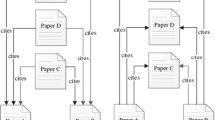Abstract
This study describes the development process of Kor-Factor, which is a novel composite evaluation index that was developed to promote Korean domestic academic journals. As more data accumulate, the Kor-Factor’s optimization process was modified in an attempt to address possible drawbacks of the original form; the result is presented in this study. This study compares Kor-Factor with the Impact Factor, which is the most well-known single element evaluation index. We found that Kor-Factor demonstrates a better power of differentiation and a greater capacity to reflect the reputability of key journals. The modified Kor-Factor, which has been developed through an optimization process, reveals a greater power of differentiation than the original Kor-Factor; however, the modified version has less capacity to reflect reputability. The evaluation elements of the modified Kor-Factor are better and are more evenly reflected on the index value than those of the original version. Finally, we propose the establishment of an appropriate data measurement period for the actual application of the index.
Similar content being viewed by others
References
Balaban, A. T. (1996). How should citations to articles in high- and low-impact journals be evaluated, or what is a citation worth? Scientometrics, 37(3), 495–498.
Dong, P., Loh, M., & Mondry, A. (2005). The “impact factor” revisited. Biomedical Digital Libraries, 2(7). doi:10.1186/1742-5581-2-7.
Glänzel, W., & Moed, H. (2002). Journal impact measures in bibliometric research. Scientometrics, 53(2), 171–193.
Korea Research Foundation. (2007). Development and preliminary application of evaluation index, Kor-Factor, based on KCI. Seoul: Korea Research Foundation (In Korean).
Korea Research Foundation. (2008). What’s new in the 2009 scholarly evaluation? Presented at: Project briefing session on Korean Citation Index (KCI) and scholarly evaluation, Seoul (In Korean).
Perneger, T. V. (2004). Relation between online “hit counts” and subsequent citations: prospective study of research papers in the BMJ. BMJ, 329, 546–547. doi:10.1136/bmj.329.7465.546.
Seglen, P. O. (1997). Why the impact factor of journals should not be used for evaluating research. BMJ, 314(7079):497. Accessed December 20, 2009, from http://www.bmj.com/cgi/content/full/314/7079/497.
Sombatsompop, N., Markpin, T., & Premkamolnetr, N. (2004). A modified method for calculating the Impact factors of journals in ISI Journal citation reports: polymer science category in 1997–2001. Scientometrics, 60(2), 217–235.
Tsay, M. Y. (1998). Library journal use and citation half-life in medical science. Journal of American Society for Information Science, 49(14), 1283–1292.
Acknowledgments
This paper was supported by Faculty Research Fund, Sungkyunkwan University, 2009.
Author information
Authors and Affiliations
Corresponding author
Rights and permissions
About this article
Cite this article
Ko, Y.M., Cho, SR. & Park, Y.S. A study on the optimization of KCI-based index (Kor-Factor) in evaluating Korean journals. Scientometrics 88, 61–71 (2011). https://doi.org/10.1007/s11192-011-0384-z
Received:
Published:
Issue Date:
DOI: https://doi.org/10.1007/s11192-011-0384-z



